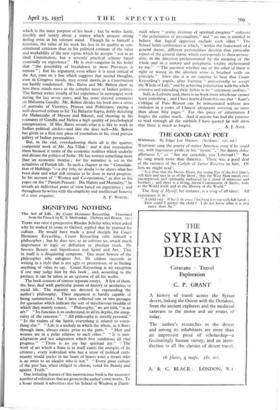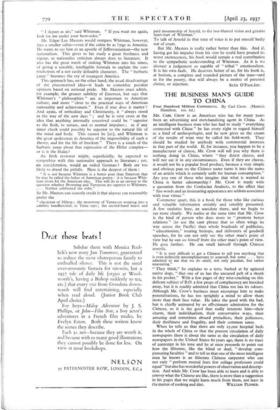THE GOOD GRAY POET
Whitman. By Edgar Lee Masters. (Scribner. us. 6d.) WHITMAN sang the poetry of native America, even if he could say, with ingenuous pride, in his " larnin' ", " No dainty dolce affettuoso I," or " See my cantabile, you Libertad ! " But he sang much more than America. There was a good deal of the vastness of the Carlyle of Sartor Resartus in him. Of him we might read : " It is thus that the Heroic Heart, the seeing Eye of the first times, still feels and sees in us of the latest ; that the Wise Man stands ever encompassed, and spiritually embraced by a cloud of witnesses and brothers ; and there is a living, literal Communion of Saints, wide as the World itself, and as the History of the World."
The Song of Myself, for instance, is a song of all times. All experience is in :
" A child said : What is the grass ? fetching it to me with full hands ; How could I answer the child ? I do not know what it is any more than he."
" I depart as air," said Whitman. " If yom.waut me again, look for me under your boot-soles."
Mr. Edgar Lee Masters would compass Whitman, however, into a smaller cabin—even if the cabin be as large as America. He wants to see him as an apostle of Jeffersonianism—the new nationalism. This gives to his study a great freshness and vigour, as nationalist criticism always does to literature. It also has the great merit of sinking Whitman into his times, of giving a sensible, intelligible formula to explain the con- tradictions of a not easily definable character. The " barbaric yawp " becomes the cry of resurgent America.
This approach has, on the other hand, the usual disadvantage of the preconceived idea—it leads to somewhat peculiar opinions based on national pride. Mr. Masters must admit, for example, the greater subtlety of Emerson, but says that Whitman's " philosophies " are as important to American culture, and more " close to the practical ways of American nationality and achievement." Even if true does it matter ? And again, of orthodoxy and Christianity, it " always stood in the way of the new days " ; and he is very cross at the idea that anything internally conceived could be " superior to the flesh, to nature, and to normal impulses ; as if any
inner check could possibly be superior to the natural life of the mind and body. This cannot be [sic], and Whitman is the great spokesman in America of the impossibility of such a
theory, and for the life of freedom." There is a touch of the barbaric yawp about that expression of the Hitler complex— or is it the Stalin ?
An Irish reviewer might, superficially, be expected to sympathise with :this nationalist approach to literature ; yet,
on consideration, would an exiled German ? Both are too likely to dread the pitfalls. Here is the deepest of them : " It is not because Whitman is a better poet than Emerson that he may be called the father of American poetry : it is because Whit- man wrote for the American idea. This will do as an answer to the question whether Browning and Tennyson are superior to Whitman. . . . Neither celebrated the tribe."
So Mr. Masters can scarcely credit it that anyone can reasonably prefer the " classicism of Milton ; the monotony of Tennyson weeping into a cambric handkerchief, as Taine says ; the second-hand music and paid mournership of Arnold, to the tear-blurred vision and genuine heart-hurt of Whitman."
To talk of Arnold in that tone of voice is to put oneself badly out of court.
But Mr. Masters is really rather better than this. And if, having got his impulse from his -ism he could have pruned its worst excrescences, his book would remain a real contribution to the sympathetic understanding of Whitman. As it is we distrust a judgement so capable of " tribal " emotionalism. It is his own fault. He deserves better of us, for his book is, at bottom, a complete and rounded picture of the man—and as for the poetry, that will always be a matter of personal











































 Previous page
Previous page